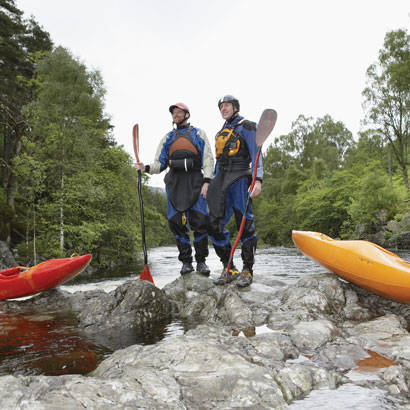
In the parks and recreation field, we are always looking for that next new program: one that gets people outside, active and interacting with nature. A program that not only provides fun and enjoyment, but also allows participants to learn to respect nature and teaches them to be one with the environment instead of trying to control it. For me, this next new program is whitewater kayaking. A sport that has seen growth around the globe, from Olympic paddlers to world-champion freestyle boaters, whitewater kayaking has grown into a worldwide phenomenon.
Getting Over the Initial Hurdles
Bringing this sport to our communities is challenging to say the least. Hurdles such as liability insurance, qualified instructors, equipment and finding good whitewater can stand in the way of providing this amazing opportunity to our towns and cities. The challenges, however, are not insurmountable and, beyond them, are the benefits of a solid whitewater kayaking program.
Whitewater kayaking can be learned by all ages, by individuals with disabilities and by those with no athletic background. The sport allows adults to get outside and stay active in a new environment. It also teaches teens and youth about respecting nature, cooperation and self-reliance — skills that will help them in the future. Most importantly, whitewater kayaking can give all of us a new program to help drive interest in our parks and promote partnerships with local river stewardship organizations, guides and outfitters, and youth organizations.
No Prior Experience Needed
To overcome the challenges and obstacles mentioned above, a programmer must stay vigilant. Be prepared to fight for your new program. I had a kayaking background before starting my whitewater kayaking camp. I had been paddling whitewater for more than five years and had my own contacts in the field. However, no prior experience is necessary to bring this program to your community.
To get the process started, doing some research on your area is necessary: Where is the closest whitewater to your town or city? Is it good beginner water (Class I/II) or is it more of an expert run (Class III/IV/V)? Rivers are classified I-V, with Class I being the easiest and Class V being runs for experts only. A good teaching river will have good Class I/II water, but nothing higher.
A good resource for this research is American Whitewater, a nonprofit dedicated to paddling and river stewardship. Their website contains a list of every whitewater river in the United States and beyond. Once you have researched local whitewater, find some local guides or outfitters who teach whitewater kayaking. These partnerships will be pivotal in starting your program.
It’s best to start out by forming partnerships with local outfitters and guides. You will want to make sure their instructors are certified through the American Canoe Association and that they are willing to work with groups. Talk to multiple companies, if available, and tell them what you are interested in. Many of them will even be able to help you in planning your program. Once you have researched the different companies, select the one with which you are most comfortable and/or that offers the most help.
Creating Your Program
The company you choose to partner with should have its own instructors, equipment and insurance, taking these concerns off your plate. Now, it is time to sit down and hash out the details of your program. Look at intro classes, youth camps and day river trips. Make your program progressive, starting with introduction courses and basic skill clinics. The next year still offer the basics, but also start to offer intermediate courses and more guided river trips to keep your participants coming back. Have frequent meetings with your partnering company to make sure you both are on the same page. And, finally make sure to market this new and exciting program. With a good marketing strategy, you should see your whitewater classes fill to capacity in no time!
To make your new whitewater kayaking program a home run, follow up with participants and follow through with the program. Start to offer river cleanups, and if you have a boat launch in your town or community, consider any improvements that can be made. Teach stewardship and offer Leave No Trace programs to ensure preservation of our rivers for future use. If you live in an area that suffers from river access problems because of land disputes, start the difficult process of opening communication with those land owners. In time, with good communication, you may see tensions ease and river access become easier.
By starting a whitewater kayaking program in your town or city, you not only can provide a new service, but you also have the ability to provide many new programs, reach more people and create a more conservation-minded community.
Brian Bevacqua, CPRP, is the Recreation Manager for the Quechee Club in Vermont.

